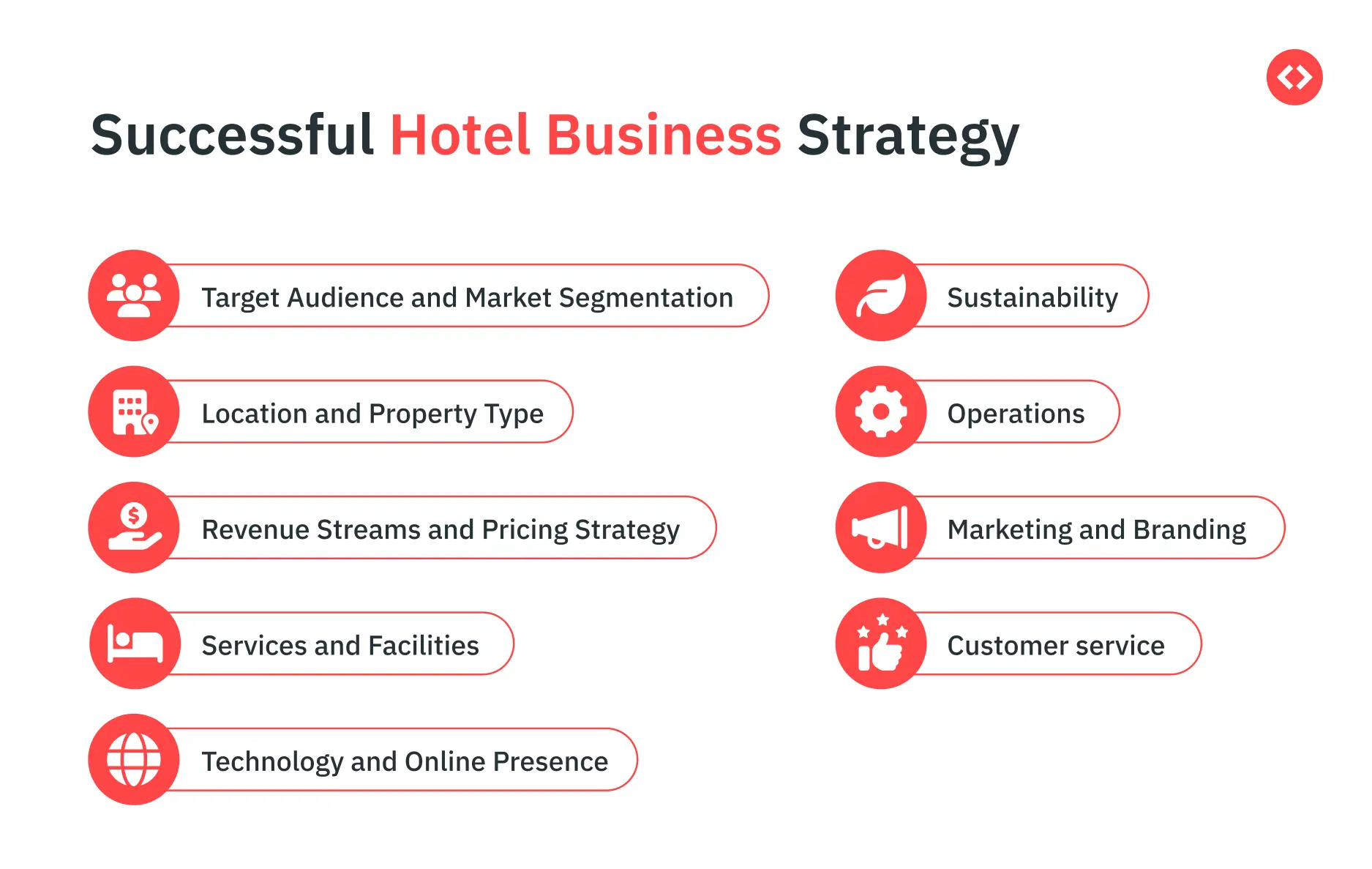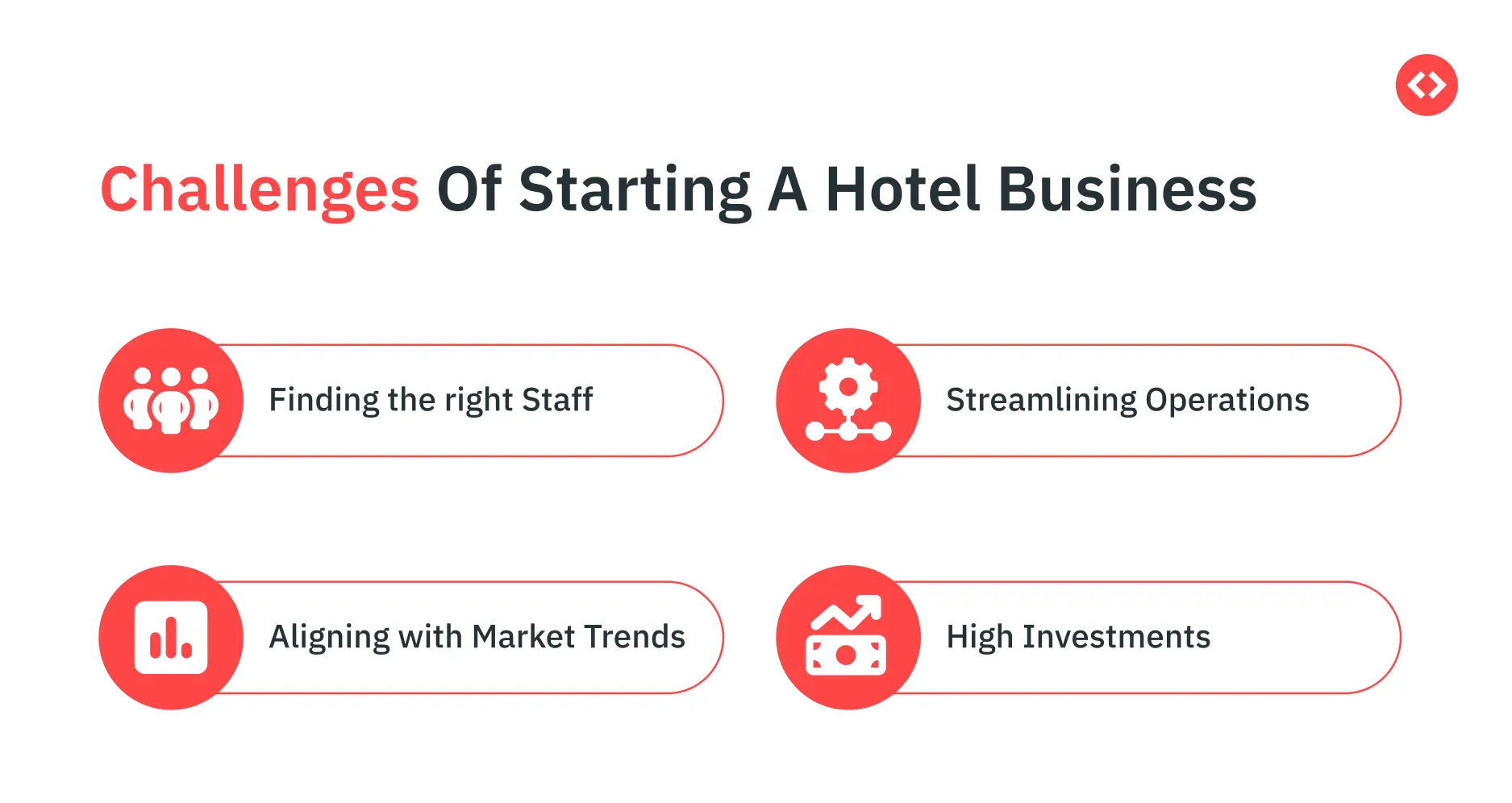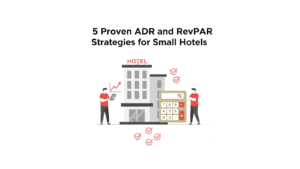Table of Contents
Updated : Jun 1, 2025
Welcome back to our comprehensive guide on “How to Start a Hotel Business.” In Part A, we explored the foundational stages of launching your own hotel, helping you navigate the crucial build or buy decision, and outlining the initial steps to get your venture off the ground. Whether you’re a hotel owner or manager, these insights are designed to help you achieve success. In this continuation, we’ll delve deeper into the process, examining further steps on how to start a hotel business and addressing some of the challenges you might encounter along the way.
Steps To Starting a Hotel Business

In our previous discussion on how to start a hotel business, we delved into the first five critical steps. First, conducting market research is your foundation, helping you understand your target audience and competition. This knowledge is key in crafting a unique selling proposition. Next, developing a comprehensive business plan is essential; it serves as your roadmap and convinces stakeholders of your vision. Choosing the right location comes next—it’s not just about aesthetics but also accessibility, demand, and growth potential, all crucial for attracting guests and ensuring profitability.
Securing financing is another pivotal step; whether through investors or loans, you’ll need to ensure you have sufficient capital to bring your hotel business dreams to life. Finally, designing your hotel concept is where creativity meets strategy. Your hotel should reflect your brand’s personality while catering to guest preferences and market trends. Now that we’ve set a firm foundation on how to start a hotel business, let’s move on to the next steps in this journey to success.
1. Comply with Legal Requirements
Navigating the legal landscape is essential when starting a hotel business. Obtain all necessary permits and licenses required for operation and adhere to local regulations regarding safety standards, health codes, and employment laws to avoid legal pitfalls.
- Local Zoning Laws: First, conduct thorough research on local zoning laws and land use regulations that affect hotel businesses in your desired location. This will guide you in selecting a site that aligns with legal stipulations and avoids future conflicts. Understanding these rules early on can save you time and resources.
- Permits & Licenses: Secure the necessary permits and licenses required to operate a hotel. These may include business licenses, health and safety permits, fire department approvals, and liquor licenses if you plan to serve alcohol. Each region may have specific requirements, so consult with local authorities or legal advisors familiar with the hospitality industry.
- Business Structure : Establish your hotel as a legal entity by choosing a suitable business structure—be it sole proprietorship, partnership, LLC, or corporation. This decision will impact everything from liability protection to tax obligations, thus it’s advisable to seek expert advice in this regard.
- Employment Laws: Ensure compliance with employment laws by drafting clear contracts and understanding labor regulations affecting hotel operations. This includes adhering to minimum wage laws, providing employee benefits, and ensuring a safe working environment.
2. Build a Strong Team
Hiring skilled personnel is vital for delivering exceptional guest experiences. Assemble a team of professionals who are not only experienced but also share your vision for the hotel business. Continuous training and development will ensure high service standards are maintained.
- Identify Key Roles: To effectively start a hotel business, begin by outlining the key roles necessary for your hotel’s operations. These typically include management, front desk staff, housekeeping, kitchen staff, concierge, and maintenance personnel. Having clear job descriptions will attract the right talent.
- Hire Experienced Professionals: Experience in the hospitality industry is invaluable. Look for candidates who have previously worked in hotels or similar settings. Their insights can help streamline processes and enhance guest satisfaction.
- Invest in Training and Development: Once you’ve brought your team on board, prioritize ongoing training. This not only equips them with the latest skills but also aligns them with your hotel’s mission and values. A well-trained team is crucial when you aim to start a hotel business that stands out.
- Foster a Positive Work Environment: Cultivating a supportive and motivating work culture is vital. Encourage open communication and recognize achievements to boost morale. A happy team translates into satisfied guests, and balanced turnover rates – an imperative factor as you start your hotel business.
- Leverage Technology Tools: Implementing technology solutions can optimize team efficiency. Use scheduling software to manage shifts or property management systems to streamline operations, ensuring you are well-prepared when you start a hotel business in 2025.
3. Create an Effective Marketing Strategy
Develop a marketing strategy that leverages both traditional and digital channels to reach potential guests. Utilize social media platforms, travel websites, and partnerships with travel agents to increase visibility and drive bookings for your hotel.
- Target Market : Begin by identifying your target market. Understand who your ideal guests are—business travelers, vacationing families, or event attendees—and tailor your messaging to meet their needs. Conduct thorough market research to gain insights into the latest trends and competitive landscape.
- Digital Marketing : Leverage digital marketing tools to enhance visibility. Invest in a user-friendly website that showcases your hotel’s unique features and amenities. Optimize your site for search engines with relevant keywords such as “How to Start a Hotel Business” to attract potential guests searching for accommodations.
- Leverage Social Media: Social media is an invaluable platform for engaging with potential guests. Create compelling content that highlights your hotel’s offerings, local attractions, and special promotions. Encourage satisfied guests to share their experiences online through reviews and testimonials.
- Offline Marketing : Consider partnerships with local businesses and tourism boards to boost your hotel’s profile. Cross-promotions and collaborations can be effective in reaching wider audiences.OTA ( Online Travel Agencies ) As a platform can also be leveraged.
4. Implement Efficient Management Systems
Invest in management software that streamlines operations, including reservations, guest services, and inventory management. Efficient systems enhance productivity, allowing you to focus on delivering high-quality experiences to your guests.
- Property Management System: To begin, invest in a Property Management System (PMS) that streamlines hotel operations, from reservations to check-out. This system should be capable of managing room bookings, tracking guest preferences, and integrating with other software such as accounting and point-of-sale systems. A well-chosen PMS can significantly enhance your understanding of how to successfully start a hotel business.
- Customer Relationship Management: Additionally, consider incorporating Customer Relationship Management (CRM) software. This tool will help you maintain comprehensive records of guest interactions, loyalty programs, and personalized services, which are essential for building long-term relationships with guests.
- Inventory Management System: Another key aspect of efficient management is the adoption of an Inventory Management System. This will ensure that all supplies, from linens to toiletries, are adequately stocked without over-purchasing, thus optimizing costs.
- Staff Management Tools: Furthermore, staff scheduling and management tools can ensure optimal staffing levels while minimizing labor costs. These tools allow for efficient communication and task delegation among team members.
- Data Analytics: Lastly, don’t overlook the importance of data analytics tools. Understanding customer trends and preferences is crucial in establishing a hotel business that meets market demands and adapts to changes.
Transform your hospitality approach today
Discover actionable strategies tailored for small hotel owners and managers creating unforgettable stays for your guests & expanding revenues for your hotel!
Start your 30-day FREE trial now!PriceLabs Supports Independent Hotel Businesses
Running a hotel means wearing many hats—guest experience, marketing, operations, and pricing. But what if your room rates could automatically adjust to demand, competition, and seasonality?
PriceLabs helps independent hotels optimize pricing with data-driven automation. With easy setup, seamless PMS integration, and full pricing control, you get more revenue with less effort.
See how it works:
Revenue Optimization & Smart Pricing
- Hotel Weights – Control how much STR vs. hotel data influences your pricing.
- Hotel Comp-Sets – Select and monitor specific competitor hotels for precise benchmarking.
- Portfolio Occupancy-Based Adjustments – Adjust prices dynamically based on room-type occupancy levels.
- Last-Minute & Far-Out Pricing Adjustments – Optimize rates for last-minute and far-out bookings.
- Min-Stay Recommendations & Length-of-Stay Rules – Automatically adjust minimum stay requirements to maximize occupancy.
- Custom Seasonal Adjustments – Set season-based pricing variations tailored to demand fluctuations.
- Date Specific Overrides – Fine-tune pricing with manual controls when needed.
Competitive Benchmarking & Market Intelligence
- Hotel Data Tab – Monitor the pricing of nearby hotel-style properties, analyze historical rate trends, and gain insights into market demand.
- Neighborhood Data Tab – Analyze short-term rental pricing trends and competitive positioning within your local market.
- Hotel Comp-Set Pricing – Benchmark your rates against a custom competitor set of similar hotels.
Seamless Integration & Workflow Efficiency
- 170+ PMS & OTA Integrations – Connect to your PMS, OTAs, and direct booking platforms effortlessly.
- Automated Rate Syncing – Ensure real-time updates across all booking channels.
- Multi-User Access & Change Logs – Role-based permissions for owners, revenue managers, and staff.
5. Focus on Customer Experience
The cornerstone of success in the hotel industry is exceptional customer service. Prioritize creating memorable experiences for guests through personalized services, attention to detail, and consistently exceeding expectations to build a loyal customer base.
- Personalized Service: Train your staff to recognize repeat guests and address them by name. Use guest preferences and feedback to tailor services, making each visit unique.
- Quality Amenities: Offer high-quality amenities that meet the needs of your target clientele. Whether it’s complimentary Wi-Fi or luxurious spa services, ensuring your amenities align with guest expectations is essential in starting a successful hotel business.
- Efficient Check-In/Out Process: Streamline your check-in and check-out procedures to minimize wait times. Consider implementing digital solutions like mobile check-ins, which can significantly improve the overall guest experience.
- Engage with Feedback: Encourage guests to provide feedback through surveys or online reviews. Act on this feedback promptly to demonstrate that you value their opinions and are committed to improving.
- Create Memorable Experiences: Organize local tours, events, or themed nights that resonate with your guests’ interests. These unique offerings can set your hotel apart in the competitive hospitality industry. Curate memorable and sustainable experiences.
- Consistency Across Touchpoints: Ensure that every interaction a guest has with your hotel—whether online or in person—is consistent and reflects the brand’s values and promises.
Challenges of Starting a Hotel Business

Venturing into the hotel industry is both exciting and demanding. Here are the challenges you may face when learning how to start a hotel business:
1. Market Competition
The hospitality sector is crowded with well-established brands, making it challenging for new entrants to carve out their niche. Understanding how to start a hotel business involves analyzing competitors’ offerings, identifying market gaps, and developing unique selling propositions that differentiate your hotel from others.
2. High Initial Investment
Starting a hotel business requires a significant financial investment. From acquiring land or property to constructing or renovating facilities, the costs can be daunting. This necessitates meticulous financial planning and securing sufficient funding or investors who believe in your vision.
3. Regulatory Compliance
Navigating the legal landscape is crucial when you learn how to start a hotel business. This includes obtaining permits, adhering to zoning laws, and meeting health and safety standards. Non-compliance can lead to costly fines or delays in opening.
4. Location Selection
Choosing the right location is pivotal in determining your hotel’s success. It involves assessing factors like accessibility, demand, local attractions, and competition density. A poorly chosen location can severely impact your ability to attract guests.
5. Human Resource Management
Recruiting and retaining skilled staff is essential for delivering exceptional guest experiences. As you discover how to start a hotel business, you’ll need to focus on creating an attractive work environment and offering competitive compensation packages to build a dedicated team.
6. Seasonal Demand Fluctuations
The hospitality industry often experiences seasonal demand shifts, impacting revenue stability. Developing strategies for off-peak periods, such as offering promotions or hosting events, is vital in maintaining business continuity.
7. Technological Integration
In today’s digital age, integrating technology into operations is non-negotiable when understanding how to start a hotel business. Implementing property management systems, online booking platforms, and customer relationship management tools can streamline operations but require careful selection and training.
8. Building Brand Loyalty
Establishing a loyal customer base takes time and effort. Providing consistent quality service and creating personalized guest experiences are essential in fostering repeat business and positive word-of-mouth referrals.
9. Sustainability Practices
Modern travelers increasingly prioritize sustainability when choosing accommodations. Incorporating eco-friendly practices into your hotel operations not only meets consumer demand but also enhances brand reputation and reduces operational costs over time.
Way Forward
Starting a hotel business in 2025 involves meticulous planning, strategic decision-making, and adaptability to changing market dynamics. By following these practical steps—from conducting thorough market research to implementing effective marketing strategies—you lay the groundwork for a successful hotel venture. As you move forward, remain committed to innovation and sustainability to ensure long-term growth and success in the competitive hospitality landscape.








